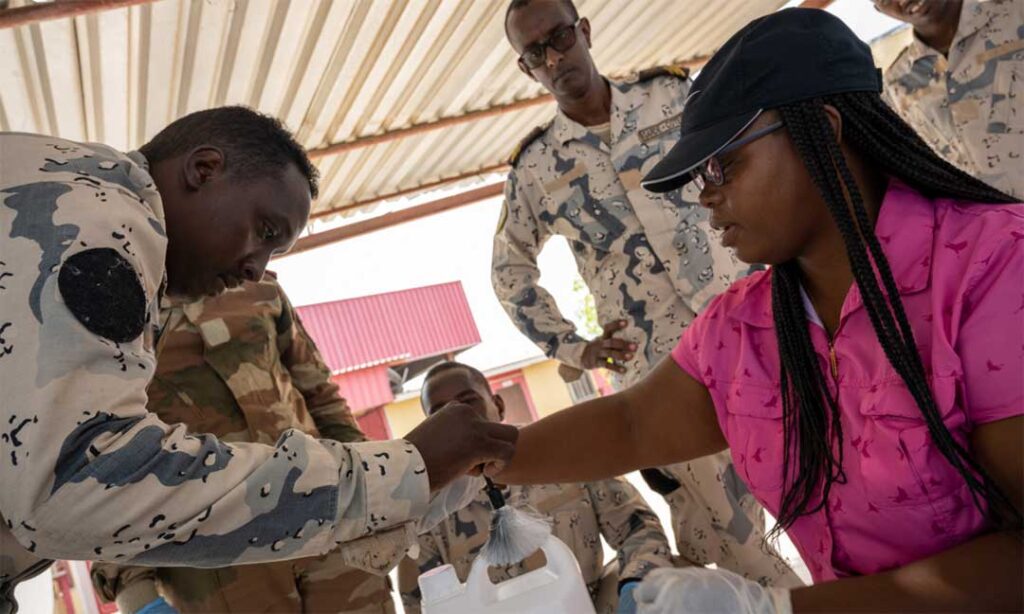ADF STAFF
The Djiboutian Coast Guard in early November learned forensic water sampling and fingerprint collection skills that will assist criminal investigations involving water contamination and drug trafficking.
The training was provided by experts from United States Naval Criminal Investigative Service (NCIS), responsible for investigating felony crimes and preventing terrorism, and the Joint Theater Forensic Analysis Center (JTFAC), a forensic laboratory that aids global military operations by tracking adversaries, eradicating their supply chains and providing evidence for prosecution.
Both the NCIS and JTFAC are housed at Camp Lemonnier in Djibouti.
“This exercise built onto the confidence and knowledge of the Djiboutian Coast Guard’s mission to keep the Djiboutian coast safe from threats and illegal activity,” said Dylan Shafer, NCIS special agent. “The skills and knowledge they learned from this instruction will help them process and analyze a maritime crime scene for evidence of criminal violations to support Djiboutian court proceedings.”
Much of the training involved collecting and processing samples of contaminated water. The samples can support the prosecution of vessels suspected of contaminating Djiboutian waters.
The training also included techniques to collect, document and process contraband, including narcotics.
Located where the Red Sea meets the Gulf of Aden at the Bab-el-Mandeb Strait, Djibouti is targeted by criminal groups seeking to ship drugs. Nearly 2,000 cargo vessels enter the Port of Djibouti annually.
Heroin that enters the country is typically bound for other countries in East Africa and Southern Africa. Cocaine shipments typically arrive in Djibouti from the Near and Middle East, southwest Asia and Lebanon, according to the Organized Crime Index.
In 2017, however, Djiboutian Police seized half a ton of cocaine disguised as flour on a shipment from Brazil. Prosecutor Maki Omar Abdoulkader said the cocaine had a street value of 1 billion Djibouti francs ($5.62 million).
Strong Bilateral Ties
The Djiboutian and U.S. militaries maintain strong bilateral military ties.
In February, the Djiboutian Navy, Japan’s Maritime Self-Defense Force and U.S. Navy participated in trilateral training to combat sea crimes at Camp Lemonnier. The joint exercise focused on visit, board, search and seizure (VBSS) tactics to combat terrorism, piracy and smuggling.
“VBSS operations are a core function of the Forces Armées Djiboutiennes Navy’s maritime strategy to combat illegal drug smuggling, illegal fishing, and human trafficking off their coast,” said Lt. Cmdr. Luis Aybar, deputy chief, Office of Security Cooperation, U.S. Embassy Djibouti. “This engagement will show each team how to come on board and successfully execute the VBSS mission.”
In March, Djibouti helped host Cutlass Express, a maritime security exercise sponsored by U.S. Africa Command. Comoros, Djibouti, Kenya, Madagascar, Mauritius, Mozambique, Seychelles and Tanzania participated.
Throughout the exercise, participants trained in tactical combat casualty care, marksmanship, at-sea maneuvers, mine countermeasures and close-combat techniques, as well as legal instruction.
In late May and early June, Djiboutian and Spanish forces partnered with the U.S. Combined Joint Task Force – Horn of Africa for the biannual Bull Shark exercise at Camp Doraleh in Djibouti. Bull Shark is a crisis response and personnel recovery exercise designed to test communication and interoperability among partner nations.
“Throughout this exercise, we had the privilege of forging an intimate alliance with our esteemed international partners, the United States of America and Spain,” said Col. Wais Omar Bogoreh, commandant of the Djiboutian coast guard. “Their invaluable expertise, support and seamless cooperation have been instrumental in attaining the resounding success we celebrate today.”

